How to Survive an Earthquake (地震逃生技巧)[优质PPT]
地震逃生方法英语作文
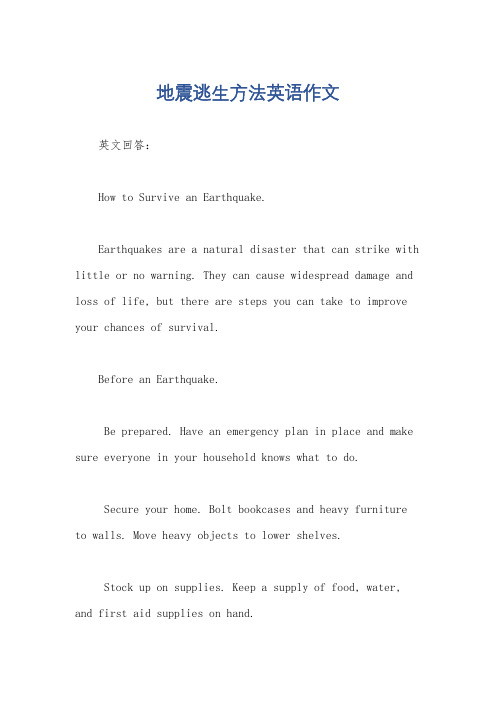
地震逃生方法英语作文英文回答:How to Survive an Earthquake.Earthquakes are a natural disaster that can strike with little or no warning. They can cause widespread damage and loss of life, but there are steps you can take to improve your chances of survival.Before an Earthquake.Be prepared. Have an emergency plan in place and make sure everyone in your household knows what to do.Secure your home. Bolt bookcases and heavy furniture to walls. Move heavy objects to lower shelves.Stock up on supplies. Keep a supply of food, water, and first aid supplies on hand.Know your evacuation route. Identify two evacuation routes from your home and practice them with your family.Be aware of your surroundings. Pay attention to the news and weather reports for any information about possible earthquakes.During an Earthquake.Drop, cover, and hold on. If you are indoors, drop to the ground, take cover under a sturdy table or desk, and hold on until the shaking stops. Stay away from windows, outside doors and walls, and anything that could fall, such as lighting fixtures or furniture.If you are outdoors, find a clear spot away from buildings, trees, and power lines. Drop to the ground and cover your head and neck with your arms.If you are in a car, pull over to the side of the road and stop. Stay in the car and wait for the shaking to stop.If you are in a wheelchair, lock your wheels and cover your head and neck with your arms.Stay calm and listen for instructions. Follow the instructions of local authorities and emergency responders.After an Earthquake.Check yourself for injuries. If you are injured, seek medical attention immediately.Check on your family and neighbors. Make sure everyone is safe and accounted for.Inspect your home for damage. Look for any structural damage, such as cracks in walls or ceilings. If you findany damage, do not enter the building and call for help.Turn off gas, water, and electricity. If you smell gas, leave the area immediately and call the gas company. If you see any downed power lines, stay away from them and callthe electric company.Be prepared for aftershocks. Aftershocks can occur for days, weeks, or even months after an earthquake. Be prepared for more shaking and follow the same safety precautions as you would during an earthquake.中文回答:地震逃生方法。
关于在地震中自救的方法(大学英语作文)

关于在地震中自救的方法大学英语作文如果你收到可能有地震的警告,继续保持收听当地广播电台的最新报告和建议,如建议关掉液化气,电源。
大力但是从高重物会把拿走。
罐子,玻璃,瓷器和其他易碎的东西在低内阁承认,行李架应该由挡手以防止物体下落。
柜子的门应关紧,出去进行悬挂对象。
准备物品的迫切需要准备:新鲜淡水和应急食物,手电,灭火器。
远离这些可能掉落的冲击你的东西,可能可以在户外的树木,消除小城镇建设,甚至如果有足够的坚固无法摧毁,碎石也可能掉下来。
跑到宽阔的地方是最理想的,但如果没有足够的时间,可能是留在房间里更安全,大街上的讲话中,煤气管道或电线烧起来会增加风险。
进出的人是最危险的通票,是非常容易受伤的砖头和石头建筑。
在房间里:当地震发生时,如果在家里,留在里面,火熄灭,远离玻璃特别是大的窗户(包括镜子等)。
在房间角落或有好的支撑的内部方法是很好的避难场所。
也许低的地面或地下室可以提供最佳的生存机会。
在桌子下或家具隐藏,这不仅能保护你,而且也有较大的呼吸空间。
当商店,是远离大的货物展厅,这些货物可能会下降下来。
还装有多层建筑中的电梯在办公室,在办公桌底原位隐藏。
不要进入电梯,楼梯也可能会人群惊惶失措的人。
车中:尽可能快和安全地停止- 但在可避免车辆停留的下落物体击中。
隐藏在座位下,蜷缩如果有东西落在车上,你将能够获得保护。
当震动停止下来,注意观察障碍物和可能出现的危险:破坏了电缆,破坏道路和桥梁坍塌。
户外:在户外的躺在地上,没有运行。
这可以扔了下来,也可能是由裂纹挪用。
远离大建设。
对地下步行或不进入画廊,这可能会导致被搁浅。
就像你已经准备到户外,没有返回的建设。
这次地震造成任何建筑不太所有被首次可靠的,那么,如果再次发生轻微震动,建筑物可以洞穴英寸到山顶更安全。
在距地球的石头是容易跌倒,如果数千吨重的土壤或岩石块(它们具有可怕的速度)压碎,很少有机会,幸好生存。
劳斯莱斯同样的球上,就像改变生存的地方。
滩地:只要是在悬崖下不能适当的安全性,但由于地震海啸,但遵循因此经常来震动后,停止离开尽快向更高的开放领域转移海滩。
如何在地震中存活下来英语作文

如何在地震中存活下来英语作文In order to survive in an earthquake, it is important to be prepared and know what to do during and after the disaster. Here are some tips on how to survive in an earthquake:1. Stay calm and take cover: When an earthquake strikes, stay calm and take cover under a sturdy piece of furniture, such as a table or desk. Protect your head and neck with your arms.2. Stay indoors: If you are indoors when an earthquake occurs, stay inside and do not run outside. Move away from windows, glass doors, and heavy furniture that could fall on you.3. Drop, cover, and hold on: If you are unable to take cover under furniture, drop to the ground, take cover against an interior wall, and hold on until the shaking stops.4. Stay put: After the shaking stops, stay put and wait for aftershocks to subside before moving. Check yourselfand others for injuries and administer first aid if necessary.5. Evacuate if necessary: If you are in a multi-story building and it is unsafe to stay inside, evacuate using the stairs and avoid using elevators.6. Listen to authorities: Follow instructions from local authorities and emergency services on how to stay safe and where to seek shelter.7. Have an emergency kit: Prepare an emergency kit with essential items such as water, food, first aid supplies, a flashlight, and batteries.地震中存活下来的关键是保持冷静、采取正确的措施并听从当局的指示。
地震中逃生十大法则
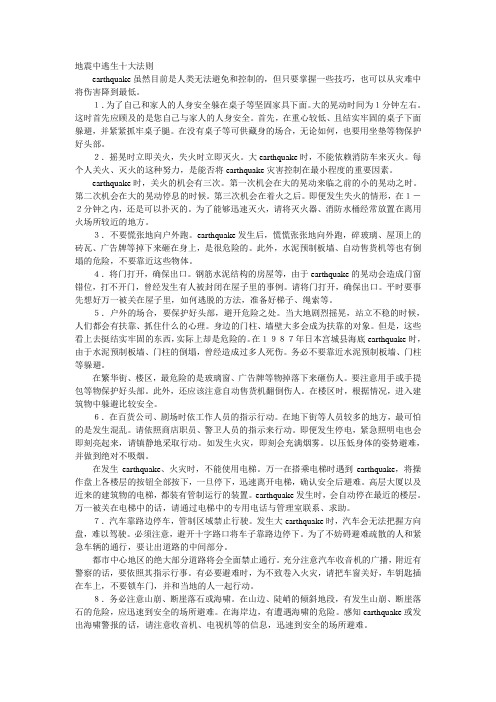
地震中逃生十大法则earthquake虽然目前是人类无法避免和控制的,但只要掌握一些技巧,也可以从灾难中将伤害降到最低。
1.为了自己和家人的人身安全躲在桌子等坚固家具下面。
大的晃动时间为1分钟左右。
这时首先应顾及的是您自己与家人的人身安全。
首先,在重心较低、且结实牢固的桌子下面躲避,并紧紧抓牢桌子腿。
在没有桌子等可供藏身的场合,无论如何,也要用坐垫等物保护好头部。
2.摇晃时立即关火,失火时立即灭火。
大earthquake时,不能依赖消防车来灭火。
每个人关火、灭火的这种努力,是能否将earthquake灾害控制在最小程度的重要因素。
earthquake时,关火的机会有三次。
第一次机会在大的晃动来临之前的小的晃动之时。
第二次机会在大的晃动停息的时候。
第三次机会在着火之后。
即便发生失火的情形,在1-2分钟之内,还是可以扑灭的。
为了能够迅速灭火,请将灭火器、消防水桶经常放置在离用火场所较近的地方。
3.不要慌张地向户外跑。
earthquake发生后,慌慌张张地向外跑,碎玻璃、屋顶上的砖瓦、广告牌等掉下来砸在身上,是很危险的。
此外,水泥预制板墙、自动售货机等也有倒塌的危险,不要靠近这些物体。
4.将门打开,确保出口。
钢筋水泥结构的房屋等,由于earthquake的晃动会造成门窗错位,打不开门,曾经发生有人被封闭在屋子里的事例。
请将门打开,确保出口。
平时要事先想好万一被关在屋子里,如何逃脱的方法,准备好梯子、绳索等。
5.户外的场合,要保护好头部,避开危险之处。
当大地剧烈摇晃,站立不稳的时候,人们都会有扶靠、抓住什么的心理。
身边的门柱、墙壁大多会成为扶靠的对象。
但是,这些看上去挺结实牢固的东西,实际上却是危险的。
在1987年日本宫城县海底earthquake时,由于水泥预制板墙、门柱的倒塌,曾经造成过多人死伤。
务必不要靠近水泥预制板墙、门柱等躲避。
在繁华街、楼区,最危险的是玻璃窗、广告牌等物掉落下来砸伤人。
要注意用手或手提包等物保护好头部。
地震逃生的九种方法

地震逃生的九种方法据统计,地球上每年约发生500多万次地震,即每天要发生上万次的震。
在地震来临的时候,要用怎么的方法逃生呢?下面就让店铺告诉你地震逃生的九种方法,一起来看看吧!地震逃生的方法选择夹角避震地震发生时,立即选择炕沿下、床前、桌下,蹲身抱头,以躲避房盖、墙砖等物体的打击。
因为这些地方可形成遮蔽塌落物体的生存空间。
但要注意切勿钻到床底下,床和桌子要坚固;衣柜不能是板式的,不要太高,太高可能倾倒。
选择厨房、厕所避震如果住的是水泥现浇板或水泥预制板屋顶的房子,地震发生时,应立即进入厨房、厕所等处,因为这些地方开间小,有上下水管道连接,既能起到一定的支撑作用,又可能找到维持生存的水和食物,有可能减少伤亡。
其弊端是回旋余地小,令人体缺少遮挡物。
首先保护自己要尽可能多地保存有生力量。
地震发生在一瞬间,不容多考虑,应当机立断,先保护好自己,如果有可能顺便再保护别人。
要记住:只有保存了自己,才有可能去抢救他人。
还要注意自己脱险后,要先救活人,先救容易救的,然后再救难救的。
以争取时间,在最短的时间内救更多的人。
护住头、口、鼻如果自己已经被埋在了废墟下面,千万不要惊慌。
要头脑冷静,先用手保护好头部和鼻子、嘴,以免受伤和让灰土进入呼吸道。
在手能动的情况下,先用手扒掉挤压身体的土石砖块,增大活动空间。
如果四肢或上肢被压住不能动弹,就要注意保存体力、养精蓄锐。
此时,精神的力量是巨大的,千万不能绝望,要坚定自己能活下去的决心,要以顽强的意志等待救援。
面对危险,哭是没有用的,唯有自救互救才有活下来的可能。
不要大声呼喊需要注意的是:地震时被砸在里面后,要立足于自救,千万不要大声呼喊,尽量减少体力消耗,你坚持的时间越长,获救的可能性越大。
须知被压在里面的人听外面的声音清楚,里面发出的声音外面却不易听见。
要积蓄体力,听到外面有人时再大声呼救。
积蓄水源节省使用水是维持生命所必需的。
地震后受困在封闭空间时,要千方百计找水。
没有水要找容器保存自己的尿液饮用;没有尿要找湿土吮吸。
如何在地震中幸存英语作文
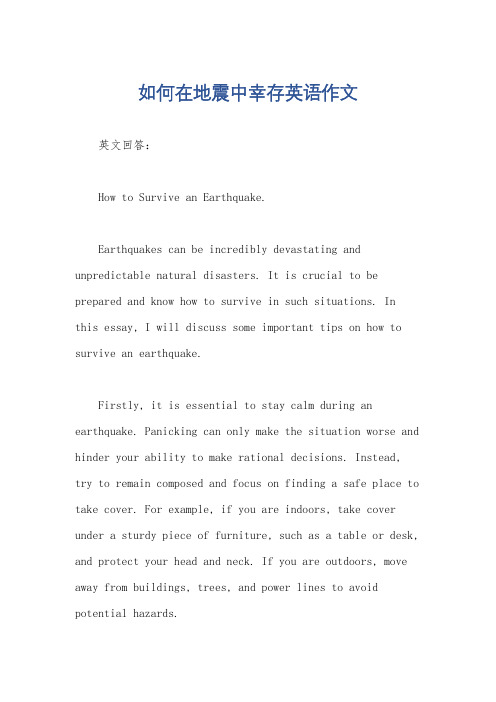
如何在地震中幸存英语作文英文回答:How to Survive an Earthquake.Earthquakes can be incredibly devastating and unpredictable natural disasters. It is crucial to be prepared and know how to survive in such situations. Inthis essay, I will discuss some important tips on how to survive an earthquake.Firstly, it is essential to stay calm during an earthquake. Panicking can only make the situation worse and hinder your ability to make rational decisions. Instead,try to remain composed and focus on finding a safe place to take cover. For example, if you are indoors, take cover under a sturdy piece of furniture, such as a table or desk, and protect your head and neck. If you are outdoors, move away from buildings, trees, and power lines to avoid potential hazards.中文回答:如何在地震中幸存。
地震是一种极具破坏力且难以预测的自然灾害。
在这种情况下,保持冷静并知道如何在地震中幸存是至关重要的。
如何在地震中活下来英语作文ai

如何在地震中活下来英语作文ai全文共3篇示例,供读者参考篇1How to Survive an EarthquakeEarthquakes are one of nature's most destructive forces. In just a matter of seconds, they can level cities, cause massive damage, and take countless lives. While we can't prevent earthquakes from happening, there are steps we can take to increase our chances of survival if one strikes. As a student living in an earthquake-prone region, understanding proper earthquake safety is crucial. In this essay, I'll share some vital tips on how to survive an earthquake based on expert recommendations and personal experiences.Before the Earthquake: Preparedness is KeyThe first step in surviving an earthquake is being prepared well before it happens. Here are some essential preparedness measures:Know Your Risks: Understand the earthquake risks in your area and the potential impacts on your home, school, or workplace. This knowledge will help you plan accordingly.Create an Emergency Plan: Develop a detailed plan that outlines what to do during and after an earthquake. Identify safe spots within your home or school, evacuation routes, and a designated meeting place for your family.Prepare an Emergency Kit: Assemble a well-stocked emergency kit that includes essential supplies like food, water, first-aid materials, flashlights, and backup batteries. Keep this kit in an easily accessible location.Secure Your Space: Take steps to earthquake-proof your living or studying environment. Secure heavy furniture and appliances to the walls, and keep breakable items on lower shelves or in cabinets with latches.Learn First Aid: Acquire basic first aid skills and knowledge to assist yourself or others in case of injuries after an earthquake.During the Earthquake: Stay Calm and React QuicklyWhen an earthquake strikes, time is of the essence, and your actions in those first few seconds can mean the difference between life and death. Here's what you should do:Drop, Cover, and Hold On: If you're indoors, immediately drop to the ground, take cover under a sturdy desk or table, andhold on to it until the shaking stops. If you're outdoors, move away from buildings, power lines, and other potential hazards.Stay Away from Windows: During an earthquake, windows can shatter and pose a significant risk of injury. Avoid standing near or attempting to move through windows.Don't Use Elevators: If you're in a multi-story building, never use elevators during an earthquake. They can become trapped or malfunction, leaving you stranded.Remain Calm: Panic can cloud your judgment and put you in harm's way. Take deep breaths, stay focused, and follow your emergency plan.After the Earthquake: Safety FirstEven after the initial shaking has subsided, there are still potential dangers to be aware of. Here's what you should do:Check for Injuries and Damage: Inspect yourself and those around you for any injuries and provide first aid if necessary. Assess the structural integrity of the building you're in and evacuate immediately if it appears unstable.Avoid Hazards: Be cautious of potential hazards like downed power lines, broken gas lines, and damaged roads or bridges.Stay away from these areas until they've been deemed safe by authorities.Listen to Emergency Broadcasts: Tune in to local radio or television stations for official updates, instructions, and information about available shelters or aid.Use Phones Only for Emergencies: Avoid making unnecessary phone calls to keep communication lines open for emergency personnel and those in dire need of assistance.Be Prepared for Aftershocks: Aftershocks can occur minutes, hours, or even days after the initial earthquake. Be ready to drop, cover, and hold on again if necessary.Surviving in the AftermathIn the days and weeks following a major earthquake, life can be challenging as communities work to recover and rebuild. Here are some tips to help you navigate this difficult period:Conserve Resources: Ration your emergency supplies, such as food, water, and fuel, until essential services and utilities are restored.Seek Shelter: If your home is uninhabitable, seek temporary shelter at designated evacuation centers or with friends or family in unaffected areas.Follow Official Instructions: Cooperate with emergency personnel and follow any instructions or evacuation orders issued by local authorities.Help Others: Once you've ensured your own safety, offer assistance to those in need, especially the elderly, disabled, or injured.Stay Informed: Continue monitoring official sources for updates on relief efforts, aid distribution, and when it's safe to return to your home or school.ConclusionSurviving an earthquake is a matter of preparation, quick thinking, and resilience. By following the tips outlined in this essay, you can significantly improve your chances of getting through this natural disaster safely. Remember, knowledge and planning are powerful tools in the face of adversity. Stay vigilant, stay calm, and stay prepared – your life may depend on it.篇2How to Survive an EarthquakeEarthquakes are one of nature's most terrifying and destructive forces. When the ground starts violently shakingbeneath your feet, it can feel like the world is ending. While we can't predict exactly when the next big one will strike, there are steps we can take to boost our chances of making it through alive. As a student, I've learned some crucial earthquake safety tips that could end up saving my life or the lives of my loved ones someday.Before an Earthquake StrikesThe key to surviving an earthquake is being prepared before it even happens. One of the most important things is to make sure my home is earthquake-ready. That means securing large furniture and appliances to the walls so they can't topple over. Anything hanging on the walls, like mirrors or artwork, needs to be firmly secured as well. It's also smart to use cabinet latches to prevent contents from spilling out during shaking.At school, I try to be aware of potential hazards like overhead lights or tall bookshelves that could fall. I make a mental note of the safest places to take cover, like under sturdy desks or against inside walls away from windows. Having an emergency plan and knowing the evacuation routes is crucial too.But preparing physically is only part of the equation. Mentally preparing and knowing what to expect can help keeppanic at bay. I've watched videos demonstrating what an intense earthquake actually feels and sounds like. The jolting motions and terrifying rumbling noises are way scarier than I imagined. But being aware of what's coming makes me feel a little more in control.When the Shaking StartsNo matter how prepared I think I am, actually experiencing "The Big One" would still be absolutely petrifying. The key thing to remember is not to panic and freeze up. As soon as that telltale rumbling starts, I need to instantly take action by getting into the drop, cover and hold on position.I'll drop down to my hands and knees to avoid falling, then crawl under the nearest sturdy desk or table if possible for cover. If there's no furniture to hide under, I'll crouch against an interior wall away from windows, shelves or other objects that could fall. I'll cover my head and neck with my hands and arms to protect from falling debris. And I'll hold on tight to whatever I'm under or bracing against and move with it until the shaking stops.Staying low and covered is crucial during the intense shaking to avoid being struck by crumbling walls, shattering windows or toppling objects. Getting trapped under a collapsed building is one of the worst-case scenarios. Shielding my head and vitalsgives me a fighting chance, even if the ceiling caves in around me.Once the initial jarring tremors have ceased, the emergency may not be over. I need to be prepared for aftershocks - smaller jolts that can topple already weakened structures. I'll continue sheltering in my safety spot until I'm confident the danger has fully passed.After an Earthquake HitsWith the earth no longer shaking, the next step is to evacuate the building if it's compromised or on fire. I'll follow predetermined evacuation routes or find the nearest safe exit, being extremely cautious of potential hazards like exposed electrical wires, shattered glass, falling debris or cracked walls.Once outside, I'll move as far away as possible from damaged buildings that could collapse and avoid power lines or broken water and gas mains. Getting to an open area away from potential threats should be the goal to wait for emergency services.If I'm trapped inside by rubble, remaining calm and avoiding moving excessively could be lifesaving. I'll try making noise or using my phone to signal for rescue teams. Protecting my mouthfrom dust with a cloth or mask and staying hydrated by accessing any available clean water are key focuses.No matter my situation, having a basic emergency kit ready with supplies like water, non-perishable food, first-aid items, tools, blankets and sanitation items would make riding out the aftermath much more manageable. Having copies of important documents and cash on hand could also prove vital.Emotional RecoveryWhile the physical impacts of an earthquake are harrowing, the psychological trauma can be equally devastating and longer-lasting. In the aftermath, anxiety, depression, nightmares and a lingering sense of fear are all common reactions. For students, feeling overwhelmed and having concentration issues that impact academics is likely.Reaching out for professional mental health support, connecting with others who went through the same ordeal, and allowing myself to feel and process difficult emotions are crucial for recovery. Returning to a routine and normal daily activities as soon as possible can also provide a much-needed sense of normalcy.Mother Nature's FuryNo matter how scary the prospect of going through a major earthquake seems, the truth is they are an inevitable part of life on this dynamic planet we call home. Deadly quakes have been documented throughout human history, with massive tectonic shifts having the power to level entire cities in an instant.But rather than living in fear, taking proactive measures to prepare and learning crucial survival strategies gives me a sense of control and resilience. We can't stop the earth from shaking, but we can boost our odds of walking away from the rubble. It's a humbling reminder of both the awesome power of our natural world and the human spirit's ability to endure through even nature's most violent tantrums.篇3How to Survive an EarthquakeEarthquakes are one of the most terrifying and destructive natural disasters that can occur. They strike without warning, violently shaking the ground and causing immense damage to buildings, infrastructure, and potentially loss of life. As a student living in an earthquake-prone region, it's crucial to be prepared and understand how to survive such a catastrophic event.First and foremost, it's essential to have an emergency plan in place. This plan should outline what to do before, during, and after an earthquake. Before an earthquake strikes, it's important to identify safe spots in each room of your home, school, or any place you frequent. These safe spots should be away from windows, heavy furniture, or anything that could fall and cause injury.Secondly, it's crucial to have an emergency kit readily available. This kit should include essential items such asnon-perishable food, water, a first-aid kit, a flashlight, a battery-powered radio, and any necessary medications. It's also a good idea to have a whistle or any other noise-making device to signal for help if needed.During an earthquake, the most important thing is to remain calm and act quickly. If you're indoors, the safest place to be is under a sturdy table or desk. Cover your head and neck with your arms to protect yourself from falling debris. If you're in a classroom or a public building, follow the instructions of your teacher or the designated emergency personnel.If you're outdoors when an earthquake strikes, move away from buildings, power lines, and other structures that could collapse. Stay in an open area until the shaking stops. If you'redriving, pull over to a safe location, away from bridges, overpasses, or any other potential hazards, and stay inside your vehicle until the shaking stops.After an earthquake, it's important to remain vigilant and follow the instructions of emergency personnel. If you're trapped or injured, try to signal for help by making noise or using any available means of communication. If you're able to safely leave the affected area, do so cautiously, as there may be debris or other hazards in your path.It's also important to be prepared for aftershocks, which can occur minutes, hours, or even days after the initial earthquake. Aftershocks can be just as dangerous as the main quake, so it's crucial to remain in a safe location until the risk has passed.In addition to having an emergency plan and kit, it's essential to educate yourself on earthquake safety. Attend any available training sessions or seminars offered by local authorities or organizations. These sessions can provide valuable information on how to properly react during an earthquake and how to minimize the risk of injury or damage.Furthermore, it's important to stay informed about the potential risks in your area. Stay up-to-date on any earthquake advisories or warnings issued by local authorities, and be awareof the evacuation routes and designated safe zones in your community.While the thought of surviving an earthquake can be daunting, it's important to remember that preparation and knowledge are key. By having an emergency plan, a well-stocked kit, and a solid understanding of earthquake safety procedures, you can significantly increase your chances of surviving such a catastrophic event.In conclusion, earthquakes are a harsh reality for many regions around the world, and being prepared is crucial for survival. As a student, it's essential to take the necessary steps to ensure your safety and the safety of those around you. By following the guidelines outlined in this essay, you can increase your chances of making it through an earthquake unharmed and be better equipped to handle the aftermath. Remember, knowledge is power, and being prepared can mean the difference between life and death in such a dire situation.。
如何在地震生存英语作文
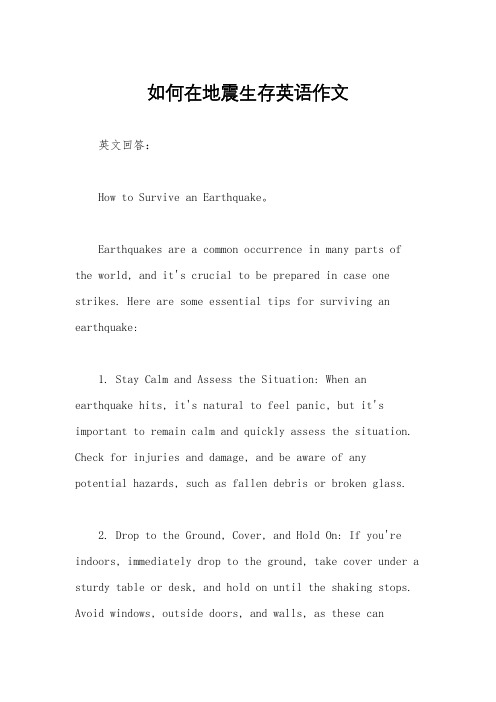
如何在地震生存英语作文英文回答:How to Survive an Earthquake。
Earthquakes are a common occurrence in many parts of the world, and it's crucial to be prepared in case one strikes. Here are some essential tips for surviving an earthquake:1. Stay Calm and Assess the Situation: When an earthquake hits, it's natural to feel panic, but it's important to remain calm and quickly assess the situation. Check for injuries and damage, and be aware of anypotential hazards, such as fallen debris or broken glass.2. Drop to the Ground, Cover, and Hold On: If you're indoors, immediately drop to the ground, take cover under a sturdy table or desk, and hold on until the shaking stops. Avoid windows, outside doors, and walls, as these cancollapse during an earthquake.3. If Outside, Stay Away from Buildings and Power Lines: If you're outdoors when an earthquake hits, move away from buildings, trees, and power lines. Stay in an open area and be aware of your surroundings.4. Be Prepared for Aftershocks: After the initial earthquake, there may be smaller aftershocks. Be preparedfor these and follow the safety precautions listed above.5. Check for Gas Leaks and Fires: After an earthquake, check your home or surroundings for gas leaks and fires. If you smell gas or see any flames, evacuate immediately.6. Turn Off Utilities: If you're able to, turn off gas, electricity, and water utilities. This will help prevent further damage and potential fires.7. Stay Hydrated and Have Food Supplies: Stock up on bottled water and non-perishable food items in case of an emergency. Make sure you have enough supplies for severaldays.8. Be Informed and Listen to Authorities: Listen tolocal news and emergency announcements for updates and instructions. Follow the guidance of authorities, and stay informed about the situation.9. Help Others and Support Your Community: After an earthquake, help those who may be injured or in need. Check on neighbors, offer assistance, and work together as a community to overcome the challenges.中文回答:如何在地震中生存。
怎样在地震中幸存英语作文建议性

怎样在地震中幸存英语作文建议性How to Survive an EarthquakeEarthquakes can be really scary! The ground starts shaking, things start falling, and it feels like the world is coming to an end. But don't worry, there are things you can do to stay safe during an earthquake. Here are some tips to help you survive if an earthquake happens:Learn the SignsBefore an earthquake happens, there might be some warning signs. The ground might start shaking a little bit, or you might hear a rumbling sound. If you notice these signs, it's important to take action right away. Tell an adult, and get ready to drop, cover, and hold on!Drop, Cover, and Hold OnThis is the most important thing to remember during an earthquake. As soon as you feel the ground shaking, drop down onto your hands and knees. Then, cover your head and neck with one arm, and crawl under a sturdy table or desk if you can. If there's no table nearby, crawl against an interior wall and cover your head and neck with both arms. Hold on to your shelter and stay put until the shaking stops.Stay Away from WindowsDuring an earthquake, windows can break and send shards of glass flying everywhere. That's why it's important to stay away from windows, mirrors, and anything else that could shatter. If you're in a room with windows, get under a table or desk and stay away from them.Don't Run OutsideWhen the ground starts shaking, your first instinct might be to run outside. But that's actually one of the most dangerous things you can do! There's a risk of falling debris, like bricks or glass, that could seriously hurt you. It's much safer to stay inside and take cover under a sturdy table or desk.Watch Out for Falling ObjectsDuring an earthquake, things can fall off shelves, walls, and ceilings. That's why it's important to stay away from tall furniture, bookcases, or anything else that could topple over. If you're in a room with a lot of stuff on the walls or shelves, try to get under a table or desk to protect yourself from falling objects.Don't Use ElevatorsIf you're in a building with elevators, don't use them during an earthquake. The shaking could cause the elevator to get stuck,or even worse, the cables could break, and the elevator could plummet. It's much safer to take the stairs, or if you can't, to stay put and take cover wherever you are.Be Prepared for AftershocksAfter the initial earthquake, there might be smaller aftershocks that can still be dangerous. Don't assume it's over just because the shaking has stopped. Stay in your safe spot until you're sure the aftershocks have stopped.Listen to AdultsDuring an earthquake, it's important to listen to the adults around you. They might have important information or instructions that could help keep you safe. Follow their lead, and don't try to do anything on your own.Have an Emergency KitIt's a good idea to have an emergency kit ready in case an earthquake happens. This should include things like bottled water, non-perishable food, a first-aid kit, a flashlight, and a battery-powered radio. That way, if you have to stay in your safe spot for a while, you'll have everything you need.Stay CalmEarthquakes can be really scary, but it's important to stay calm. Panicking won't help you stay safe. Take deep breaths, and remember that if you follow these tips, you'll have a much better chance of getting through the earthquake safely.Remember, earthquakes can happen without warning, so it's important to be prepared. Practice these safety tips with your family and friends, and you'll be ready if an earthquake strikes. Stay safe out there!。
英语作文在地震里如何逃脱

英语作文在地震里如何逃脱英文回答:How to Escape in an Earthquake.An earthquake is a sudden, violent shaking of theground that can cause widespread devastation. If you are caught in an earthquake, there are a few things you can doto help you escape.1. Stay calm. It is important to stay calm andcollected in the event of an earthquake. This will help you to think clearly and make good decisions.2. Drop to the ground. The first thing you should do when an earthquake strikes is to drop to the ground. This will help you to avoid being knocked over by falling objects.3. Cover your head and neck. Once you are on the ground,cover your head and neck with your arms. This will help to protect you from falling debris.4. Find a sturdy object to hold onto. If you can, finda sturdy object to hold onto. This will help to keep you from being thrown around by the earthquake.5. Stay away from windows and outside doors. Windows and outside doors can be dangerous during an earthquake. Falling glass and debris can cause serious injuries.6. If you are in a car, pull over to the side of the road and stop. If you are in a car when an earthquake strikes, pull over to the side of the road and stop. Do not drive under bridges or overpasses.7. If you are in a building, stay inside. If you are ina building when an earthquake strikes, stay inside. Do not try to leave the building, as you could be injured by falling debris.8. Find a safe place to shelter. Once the earthquakehas stopped, find a safe place to shelter. This could be in a sturdy building, a basement, or under a sturdy table.9. Be prepared for aftershocks. Aftershocks are smaller earthquakes that can follow a larger earthquake. Beprepared for aftershocks by staying in a safe place and by listening to the radio for updates.10. Help others. If you are able, help others who have been injured or displaced by the earthquake.中文回答:地震中如何逃生。
如何在地震中幸存英语作文80词左右
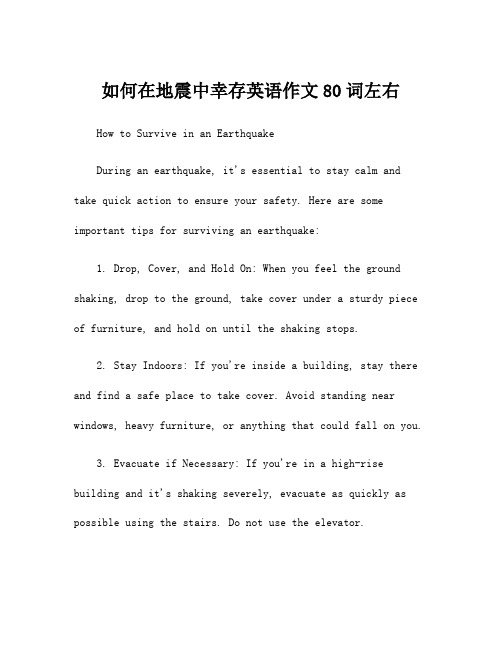
如何在地震中幸存英语作文80词左右How to Survive in an EarthquakeDuring an earthquake, it's essential to stay calm and take quick action to ensure your safety. Here are some important tips for surviving an earthquake:1. Drop, Cover, and Hold On: When you feel the ground shaking, drop to the ground, take cover under a sturdy piece of furniture, and hold on until the shaking stops.2. Stay Indoors: If you're inside a building, stay there and find a safe place to take cover. Avoid standing near windows, heavy furniture, or anything that could fall on you.3. Evacuate if Necessary: If you're in a high-rise building and it's shaking severely, evacuate as quickly as possible using the stairs. Do not use the elevator.4. Stay Away from Dangerous Areas: After the shaking stops, be cautious of potential hazards such as falling debris, broken glass, and damaged structures. Stay away from damaged buildings and power lines.5. Be Prepared: It's important to have an emergency kit with essentials such as food, water, a flashlight, and afirst aid kit. Being prepared can make a big difference in the aftermath of an earthquake.By following these tips and staying informed about earthquake safety, you can increase your chances of surviving an earthquake and staying safe during a natural disaster. Remember to always be prepared and know how to respond in case of an emergency.。
地震来了如何安全逃生英语作文
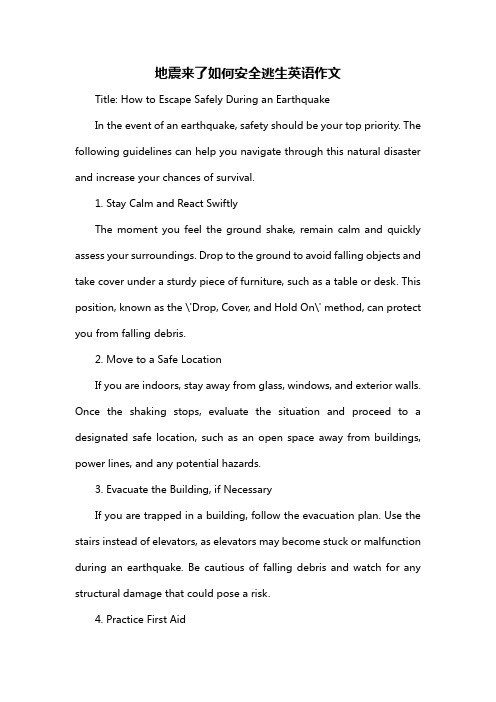
地震来了如何安全逃生英语作文Title: How to Escape Safely During an EarthquakeIn the event of an earthquake, safety should be your top priority. The following guidelines can help you navigate through this natural disaster and increase your chances of survival.1. Stay Calm and React SwiftlyThe moment you feel the ground shake, remain calm and quickly assess your surroundings. Drop to the ground to avoid falling objects and take cover under a sturdy piece of furniture, such as a table or desk. This position, known as the \'Drop, Cover, and Hold On\' method, can protect you from falling debris.2. Move to a Safe LocationIf you are indoors, stay away from glass, windows, and exterior walls. Once the shaking stops, evaluate the situation and proceed to a designated safe location, such as an open space away from buildings, power lines, and any potential hazards.3. Evacuate the Building, if NecessaryIf you are trapped in a building, follow the evacuation plan. Use the stairs instead of elevators, as elevators may become stuck or malfunction during an earthquake. Be cautious of falling debris and watch for any structural damage that could pose a risk.4. Practice First AidInjuries may occur during an earthquake. Learn basic first aid techniques, such as how to stop bleeding, perform CPR, and treat common injuries. Keep a first aid kit readily available in your home, car, and workplace.5. Be Prepared for AftershocksAftershocks can occur in the aftermath of an earthquake, so be prepared to take cover again if necessary. Stay away from damaged areas and be cautious of any potential gas leaks, fires, or electrical hazards.6. Communicate with Loved OnesCheck on the safety of family and friends. Use text messaging or social media to inform them of your status, as phone lines may be overwhelmed. Have a designated meeting point in case you become separated.7. Follow Instructions from AuthoritiesPay attention to updates and instructions from local authorities, emergency services, and the news. These sources will provide vital information on evacuation orders, relief efforts, and safety precautions.8. Be Prepared BeforehandPreparation is key to surviving an earthquake. Create an emergency kit with essential supplies, such as food, water, flashlights, batteries, a radio, and a first aid kit. Familiarize yourself with the emergency plans for your area and participate in earthquake drills.Remember, the key to surviving an earthquake is to remain calm, react quickly, and follow these safety guidelines. By doing so, you can increase your chances of escaping unharmed during this unpredictable natural disaster.。
怎样在地震中存活英语作文

怎样在地震中存活英语作文How to Survive an Earthquake。
An earthquake is a sudden and violent shaking of the ground, caused by the shifting of tectonic plates beneath the Earth's surface. Earthquakes can cause massive destruction and loss of life, but there are steps you can take to increase your chances of survival.Before an Earthquake。
1. Prepare an emergency kit: This should include food, water, first aid supplies, a flashlight, and a battery-powered radio.2. Secure your home: Anchor heavy furniture to the walls, install latches on cabinets and drawers, and secure appliances and electronics.3. Identify safe spots: Identify the safest spots inyour home, such as under a sturdy table or against aninterior wall.During an Earthquake。
1. Drop, cover, and hold on: Drop to the ground, take cover under a sturdy piece of furniture, and hold on until the shaking stops.2. Stay away from windows: Stay away from windows, mirrors, and other glass objects that could shatter and cause injury.3. Protect your head: Cover your head and neck withyour arms and hands to protect yourself from falling debris.After an Earthquake。
地震逃生自救方法

地震逃生自救方法地震逃生自救方法在家中,就近躲在结实、不易倾倒的家具下面,或躲在墙角、卫生间,不要使用电梯逃生。
在公共场所,要远离玻璃橱窗和货架等易倾倒的物品,听从工作人员指挥,不要拥挤。
在户外,要躲开建筑物、桥梁或山坡,寻找空旷的安全地点。
被困废墟要节省体力,用敲击的方法呼救。
地震发生时正确的做法1、选择坚固牢靠的角落或家具来躲避建筑物坍塌的打击。
2、选择空间较小稳定性相对来说更好的功能房躲避。
3、如果自己被埋在废墟,要保护自己的重要部位,例如头部和面部,尽可能加固周边空间,给自己增加生存几率。
4、在地震刚结束又受伤的情况下,不要盲目的呼救大喊,要积蓄体力,想办法先为自己控制伤势,当听见动静的时候再拼命呼救。
5、如果被埋较深,短时间内无法被救援,要在有限的空间内为自己准备续命的粮食和水源。
6、地震的时候首先要保证自己的安全再去救人,救人的原则是先救活人,救容易救的,壮大救援力量深处救援。
如自己遭遇被困要有信心,不要太过慌乱和悲观。
地震的危害地震引起的灾害有直接灾害,也有由直接灾害引发的次生灾害。
直接灾害是由于地震的直接作用,如地震波产生的强烈震动、地震断层错动和地面变形,引起房屋破坏、工程设施损毁、物品损坏等,以及由此造成的人员压埋和伤害,属于地震直接灾害,主要包括:(1)房屋破坏。
地震的最直接破坏对象就是房屋。
房屋修建在地面,量大面广,房屋受损或者倒塌不仅造成巨大的建筑财产损失,而且还会因砸压造成人员伤亡和器物财产损失。
(2)基础设施破坏。
人工建造的基础设施,如交通、电力、通信、供水、排水、燃气、输油、供暖等生命线系统,大坝、灌渠的水利工程,都是地震破坏的对象。
这些设施被破坏的后果,既包括本身的经济价值丧失,也包括功能丧失带来的损失,加剧了地震灾害。
(3)工业能力破坏。
工业设施、生产设备、装置的破坏,不仅造成了直接物质财产的损失,而且还将影响震后的回复重建、物资供应和经济发展。
(4)室外财产破坏。
地震中如何生存英语作文

itle: How to Survive an EarthquakeAn earthquake is a natural disaster that can strike without warning, causing widespread panic and destruction. In order to increase your chances of survival during an earthquake, it is important to be prepared and know what to do before, during, and after the event.Before an Earthquake:1.Create an emergency plan: Discuss with your family and friends what to do duringan earthquake. Designate a meeting place outside your home in case you are separated.2.Prepare an emergency kit: Pack essential items such as bottled water, non-perishable food, a first aid kit, flashlights, batteries, and a portable radio.3.Secure your home: Identify potential hazards in your home such as heavyfurniture, mirrors, and appliances. Secure these items to prevent them from falling and causing injury.During an Earthquake:1.Stay calm: It is important to remain calm and not panic during an earthquake. Thiswill help you make better decisions and stay focused.2.Drop, cover, and hold on: When the earthquake begins, drop to the ground, takecover under a sturdy piece of furniture, and hold on until the shaking stops. This will protect you from falling debris and help you avoid injury.3.Stay away from windows and glass: Glass can shatter during an earthquake,causing serious injury. Stay away from windows and glass doors to protect yourself.After an Earthquake:1.Check for injuries: Assess yourself and others around you for injuries. If someoneis injured, apply basic first aid and seek medical help if necessary.2.Evacuate if necessary: If your home is damaged or if there is a risk of collapse,evacuate to a safer location. Do not use elevators during an earthquake.3.Turn off utilities: If you can safely do so, turn off gas, electricity, and water linesto prevent fires and other hazards.4.Be cautious of aftershocks: Aftershocks can occur after the initial earthquake. Beprepared and know what to do if another quake occurs.In conclusion, surviving an earthquake requires preparation, knowledge, and quick thinking. By following these tips, you can increase your chances of survival and minimize the risk of injury during an earthquake.。
地震逃生自救方法2篇
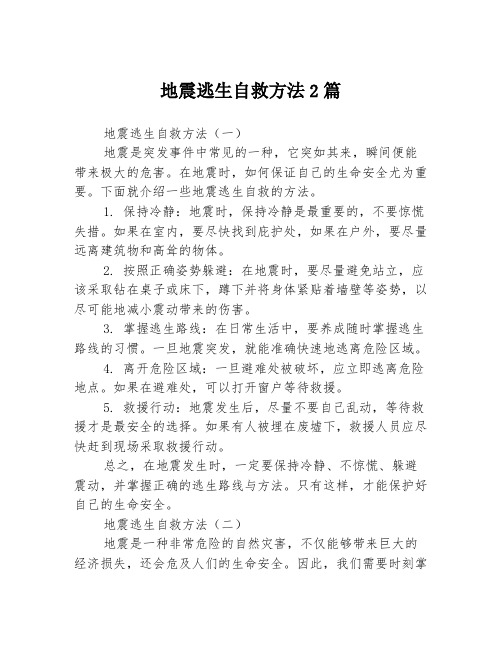
地震逃生自救方法2篇地震逃生自救方法(一)地震是突发事件中常见的一种,它突如其来,瞬间便能带来极大的危害。
在地震时,如何保证自己的生命安全尤为重要。
下面就介绍一些地震逃生自救的方法。
1. 保持冷静:地震时,保持冷静是最重要的,不要惊慌失措。
如果在室内,要尽快找到庇护处,如果在户外,要尽量远离建筑物和高耸的物体。
2. 按照正确姿势躲避:在地震时,要尽量避免站立,应该采取钻在桌子或床下,蹲下并将身体紧贴着墙壁等姿势,以尽可能地减小震动带来的伤害。
3. 掌握逃生路线:在日常生活中,要养成随时掌握逃生路线的习惯。
一旦地震突发,就能准确快速地逃离危险区域。
4. 离开危险区域:一旦避难处被破坏,应立即逃离危险地点。
如果在避难处,可以打开窗户等待救援。
5. 救援行动:地震发生后,尽量不要自己乱动,等待救援才是最安全的选择。
如果有人被埋在废墟下,救援人员应尽快赶到现场采取救援行动。
总之,在地震发生时,一定要保持冷静、不惊慌、躲避震动,并掌握正确的逃生路线与方法。
只有这样,才能保护好自己的生命安全。
地震逃生自救方法(二)地震是一种非常危险的自然灾害,不仅能够带来巨大的经济损失,还会危及人们的生命安全。
因此,我们需要时刻掌握一些基本的地震逃生自救方法,以便在地震来临时能够及时采取应对措施。
1. 安全地带:在地震来临时,首先要考虑自己的安危,找到最安全的地方避难。
一般来说,水平运动的地震相对较轻,所以可以选择在室内或者车内等地方避难。
2. 保持冷静:在面对突然来袭的地震时,首先要保持冷静,并采取正确的逃生方式。
一般来说,应该蹲下并用手保护头部,这样可以最大程度地减少受伤的风险。
3. 掌握逃生路线:地震发生时,一定要掌握逃生路线,并且要在平时多次进行演练,以便做到心中有数,一旦地震来临可以快速安全地逃生。
4. 护好口鼻:在地震来临时,空气中会产生大量的灰尘,这些灰尘对人体非常有害。
因此,在逃生的过程中,应该用湿毛巾或者口罩等保护好口鼻,以防吸入大量的灰尘。
地震逃生方法有哪些(正确的地震逃生方法)

地震逃生方法有哪些(正确的地震逃生方法)可以就近躲避,躲在不容易倾倒的物体下,有支撑的地方。
如果是室外建议尽可能远离建筑物,来到安全开阔的地方。
需要保持身体趴下,不要压住口鼻,可以保持顺利的呼吸。
应保持低头的姿势,保护好自己的颈部以及头部,可以用身边的物品来达到保护的效果。
地震时室外如何逃生应选择来到开阔的地方,避免人多的场所,不应该随意的返回到室内。
尽可能避开高大的建筑物,比如立交桥,水塔,烟囱,过街桥。
还需要避开一些悬挂物,比如电线杆,变压器,调车,广告牌,还有路灯。
需要避开其他危险的场所,比如危旧房屋,狭窄的街道,还有砖瓦。
在家中遇到地震该怎么办应及时关闭煤气以及水电,以免发生自身灾害,不要选择躲在衣柜里面或者床底下,应该远离有悬挂物的地方,比如空调还有吊灯。
最好是把门直接打开,双手抱着头,在地震结束之后可以迅速的撤离现场。
应选择有承重墙的墙角,比如三角地带容易躲藏,不容易被砸伤,所以可以选择躲在家里面的卫生间有较大的生存几率。
在高楼时遇到地震该怎么办远离高楼层的窗户,面向马路的这边墙并不是很稳定,在地震时框架没了,此时很容易被甩出去。
在地震发生时一定不要使用电梯,一旦遭遇断电,很可能会卡在里面出不来。
万一在搭乘电梯时遭遇地震,可以按所有的流程,一旦停下就可以迅速的离开。
在地震发生之后往哪里跑自然是以就近的原则,离楼顶近应跑向楼顶,离地面近应跑向地面,总之见天见地都需要尽快的和外界接触,这才是保障安全的一种做法。
选择正确的操作可以保证安全,减少不必要的意外。
howtosurviveanearthquake(★)
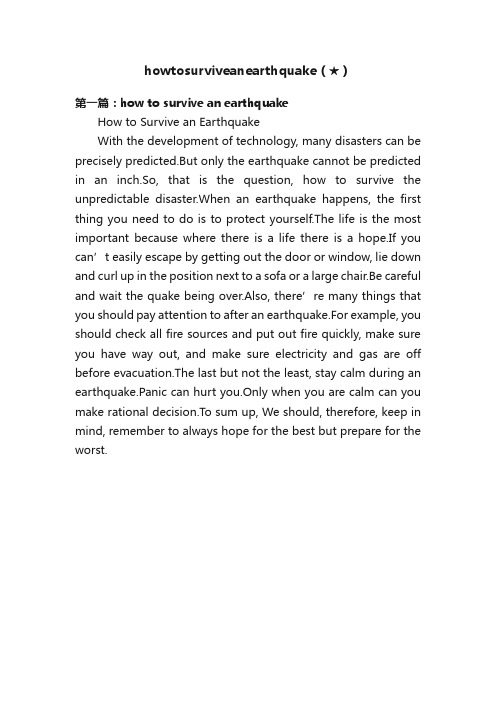
howtosurviveanearthquake(★)第一篇:how to survive an earthquakeHow to Survive an EarthquakeWith the development of technology, many disasters can be precisely predicted.But only the earthquake cannot be predicted in an inch.So, that is the question, how to survive the unpredictable disaster.When an earthquake happens, the first thing you need to do is to protect yourself.The life is the most important because where there is a life there is a hope.If you can’t easily escape by getting out the door or window, lie down and curl up in the position next to a sofa or a large chair.Be careful and wait the quake being over.Also, there’re many things that you should pay attention to after an earthquake.For example, you should check all fire sources and put out fire quickly, make sure you have way out, and make sure electricity and gas are off before evacuation.The last but not the least, stay calm during an earthquake.Panic can hurt you.Only when you are calm can you make rational decision.T o sum up, We should, therefore, keep in mind, remember to always hope for the best but prepare for the worst.。
- 1、下载文档前请自行甄别文档内容的完整性,平台不提供额外的编辑、内容补充、找答案等附加服务。
- 2、"仅部分预览"的文档,不可在线预览部分如存在完整性等问题,可反馈申请退款(可完整预览的文档不适用该条件!)。
- 3、如文档侵犯您的权益,请联系客服反馈,我们会尽快为您处理(人工客服工作时间:9:00-18:30)。
Alittleknowledgeandafewprecautionarymeasu rescanenormouslyincreaseyourchkeoranyothertypeofhazard.Thekeysareeducation andpreparinginadvance.Theearthquakesafetyti psbelowcouldmakealifesavingdifferenceifyoufindyourselfinanearthqu akesituation.Investinyourpersonalsafetybystud yingbelow.
If you are cooking, turn off the stove and take cover.
If you are outdoors, move to an open area where falling objects are unlikely to strike you. Move away from buildings, power lines and trees.
Before the Earthquake
Teach all members of your family about earthquake safety. This includes:
1) the actions you should take when an earthquake occurs
Arrange your home for safety: Store heavy objects on lower shelves and store breakable objects in cabinets with latched doors. Don’t hang heavy mirrors or pictures above where people frequently sit or sleep.
Anchor (fasten) heavy appliances and furniture such as water heaters, refrigerators and bookcases.
Learn where the main turnoffs are for your water, gas and electricity. Know how to turn them off and the location of any needed tools.
2) the safe places in a room such as under a strong desk, along interior walls
3) places to avoid such as near windows, large mirrors, hanging objects, heavy furniture and fireplaces
After the Earthquake
Check for injuries, attend to injuries if needed, help ensure the safety of people around you.
Check for damage. If your building is badly damaged you should leave it until it has been inspected by a safety professional.
If you are driving, slow down smoothly and stop on the side of the road. Avoid stopping on or under bridges and overpasses, or under power lines, trees and large signs. Stay in your car.
Stock up on emergency supplies. These include:
battery operated radio (and extra batteries), flashlights (and extra batteries), first aid kit, bottled water, two weeks food and medical supplies, blankets, cooking fuel, tools needed to turn off your gas, water and electric utilities.
If you smell or hear a gas leak, get everyone outside and open windows and doors. If you can do it safely, turn off the gas at the meter. Report the leak to the gas company and fire department. Do not use any electrical appliances because a tiny spark could ignite the gas.
During the Earthquake
If you are indoors, stay there. Quickly move to a safe location in the room such as under a strong desk, a strong table, or along an interior wall. The goal is to protect yourself from falling objects and be located near the structural strong points of the room. Avoid taking cover near windows, large mirrors, hanging objects, heavy furniture, heavy appliances or fireplaces. Do not use elevators.
